Over the last 30 years, the Jumpman logo has become internationally recognizable. The soaring silhouette is easily identified throughout the globe.
The logo likened to an airborne Michael Jordan defines what we now know as Jordan Brand. It first appeared on Tinker Hatfield’s series saving Air Jordan 3 and has since stamped spikes likened to Derek Jeter, game jerseys for the Detroit Pistons, and non-licensed novelties like jewelry and bumper stickers.
For purists, however, it’s the logo that preceded it that really hits.
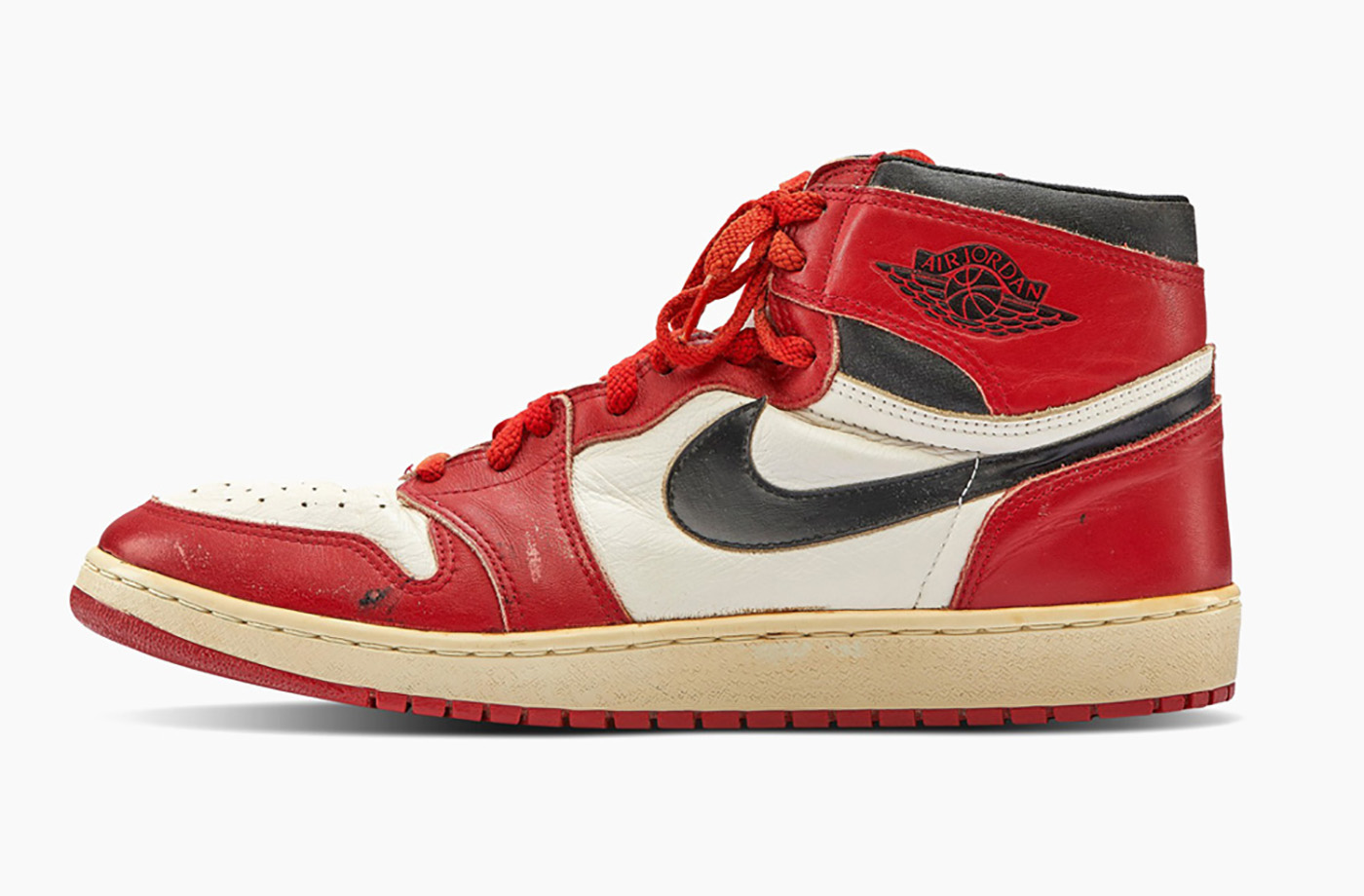 Image via Sotheby’s
Image via Sotheby’s
Yes, the Wings logo.
In 1985, Michael Jordan proved the ultimate vehicle to move Swoosh branded sneakers. The flight-inspired Wings logo signified his airborne endorsement. Funny enough, what instantly became a symbol for flight and youth culture originated while designer Peter Moore watched children board an airplane.
“I’m walking into the plane and I see this little kid and he’s got this set of captain wings on his shirt,” Moore recalled to SLAM. “They’re plastic. The flight attendant had just given it to him. So I said, ‘Can I have a pair of those wings?’ The lady looked at me like I was some kind of a jerk, but she gave me the wings and I sat down and started drawing the wings. I put a basketball in the middle of them. This was all being done on a cocktail napkin while Rob [Strasser] and I are flying home. That became the logo.”
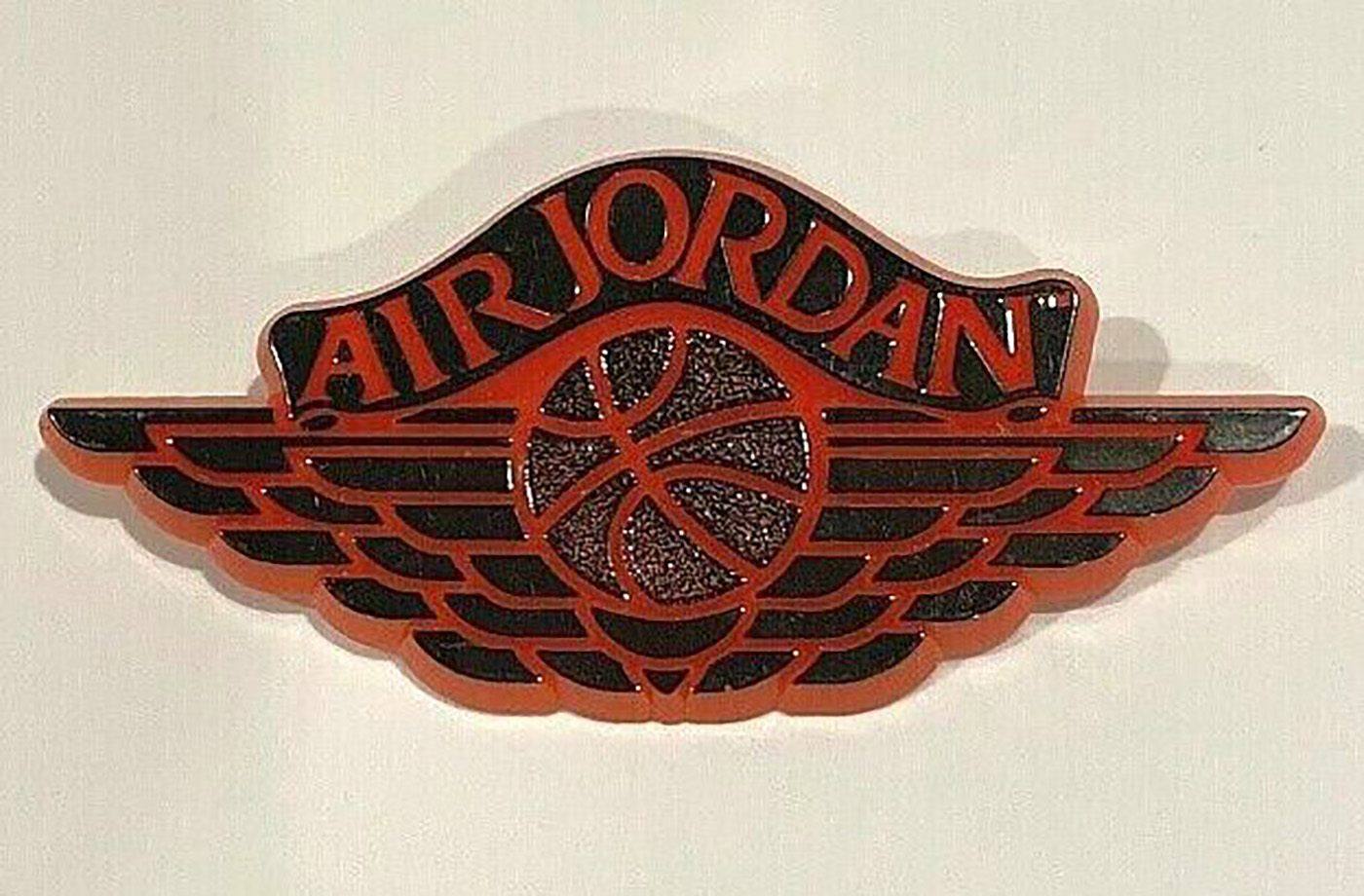 Image via Nice Kicks
Image via Nice Kicks
That cocktail napkin sketch immediately said a lot. In a few strokes, the Wings logo signified that the product it stamped was personal to Michael, intended for children, and inspired by flight.
As a novelty, Nike even went as far as to make Wings logo pins to play all the way into the aviation theme. This sentiment of storytelling was carried over through print ads placing MJ on a runway, making the most of Moore’s background in staging overtly thematic posters for Nike.
Moore’s logo made sense, but the tale of tape suggests there was some trial and error before arriving at the final product. Archival samples show a Nike branded Wings logo – said to be limited to three pairs produced – while promotional photos feature Mike with a pair of ‘AIR JORDAN’ stamped samples hanging from his shoulder.
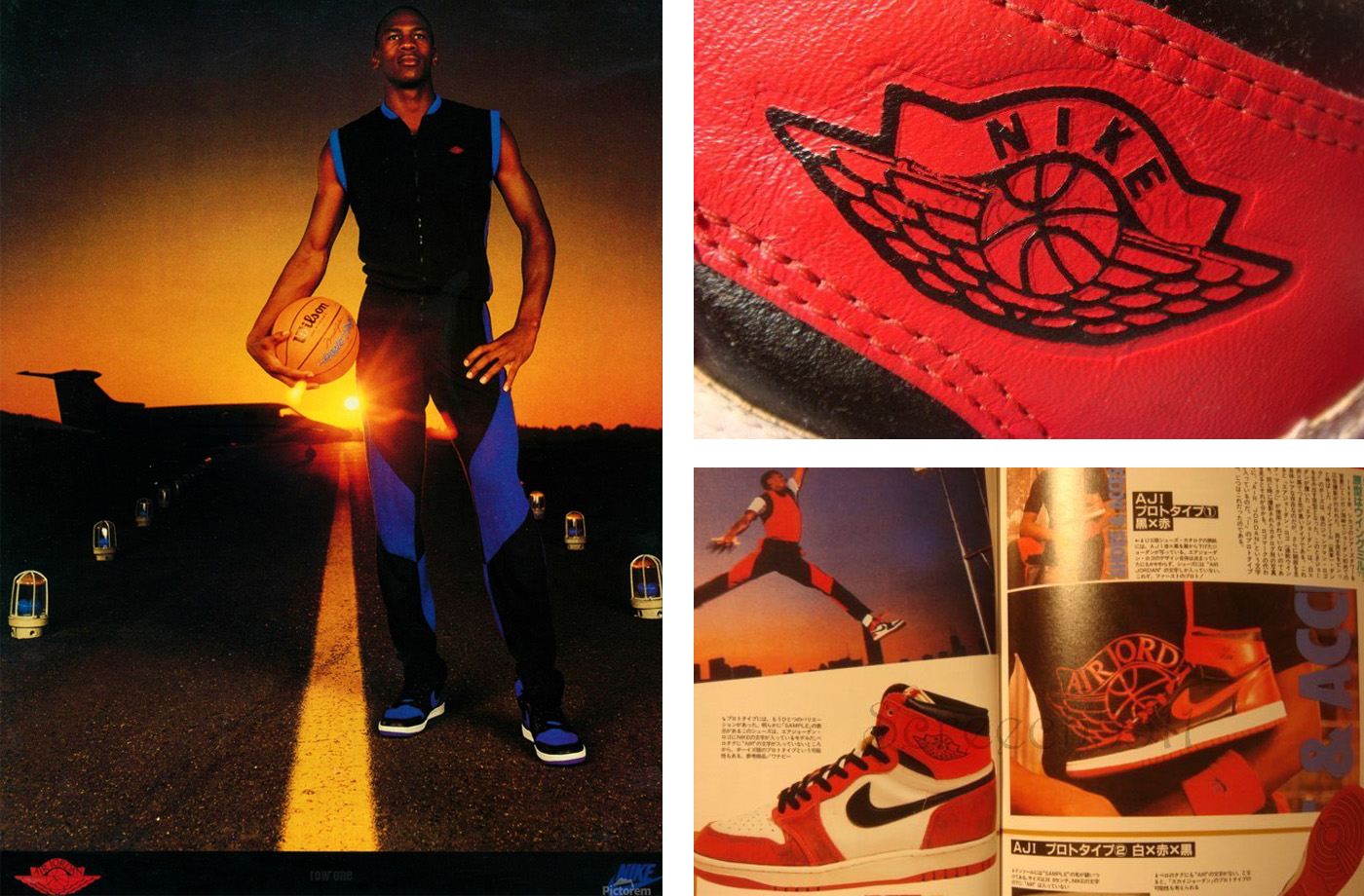 Images via Pictorem & Like Mike Clothing
Images via Pictorem & Like Mike Clothing
As we all know, the eventual retail rendition proved a combination of both benched ideas, setting the franchise in flight while adding nostalgia to the scrapped samples.
Months after Moore’s napkin sketch, the Air Jordan franchise and its newly coined Wings logo arrived during Michael Jordan’s rookie season, 1984-1985, taking off quite literally and figuratively. While it will forever be tied to the franchise’s ascent, the Wings logo would be replaced, reimagined, and rebranded in the 80s it arrived and every era that followed.
1980s
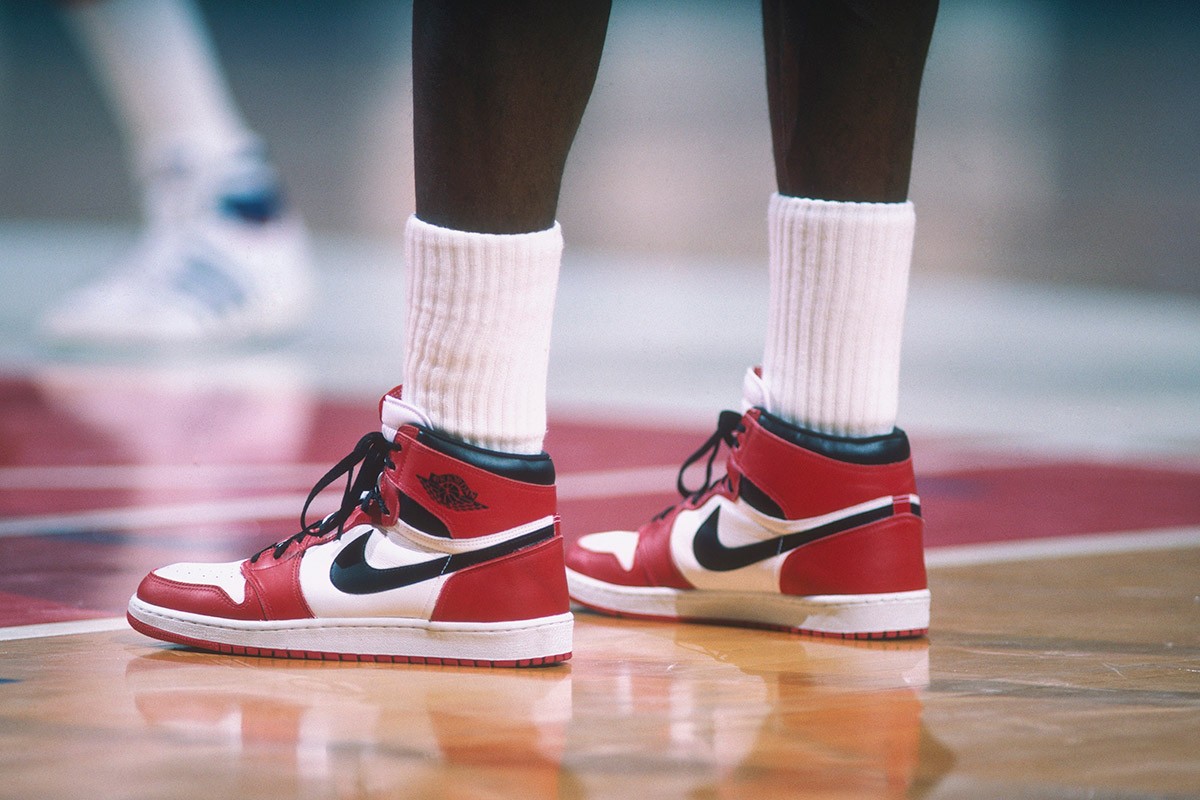 Image via Focus On Sport / Getty Images
Image via Focus On Sport / Getty Images
As history tells us, the Air Jordan 1 debuted on court in November of 1984. At that time, to see Michael Jordan live in action, your best bet was to have tickets to a game or local access to WGN.
By February of 1985, a young MJ quickly became a household name by making the NBA All-Star Game as a rookie starter and appearing in the Slam Dunk contest. Both “Chicago” and “Banned” Air Jordan 1s appeared in ASW action, with the latter starring in the infamous commercial that made light of David Stern putting a kibosh on the Air Ship’s Black/Red color scheme.
Building a massive buzz, the Air Jordan 1 arrived at retail in April of 1985 and absolutely blew the doors off stores. The $65 sneakers and matching merchandise made Nike do $100 Million in sales that year alone, almost doubling its ‘84 earnings. The shoes and apparel were so hot that shops across the country constantly reordered items to keep them in stock, resulting in the AJ1 remaining in retail circulation for years after its launch.
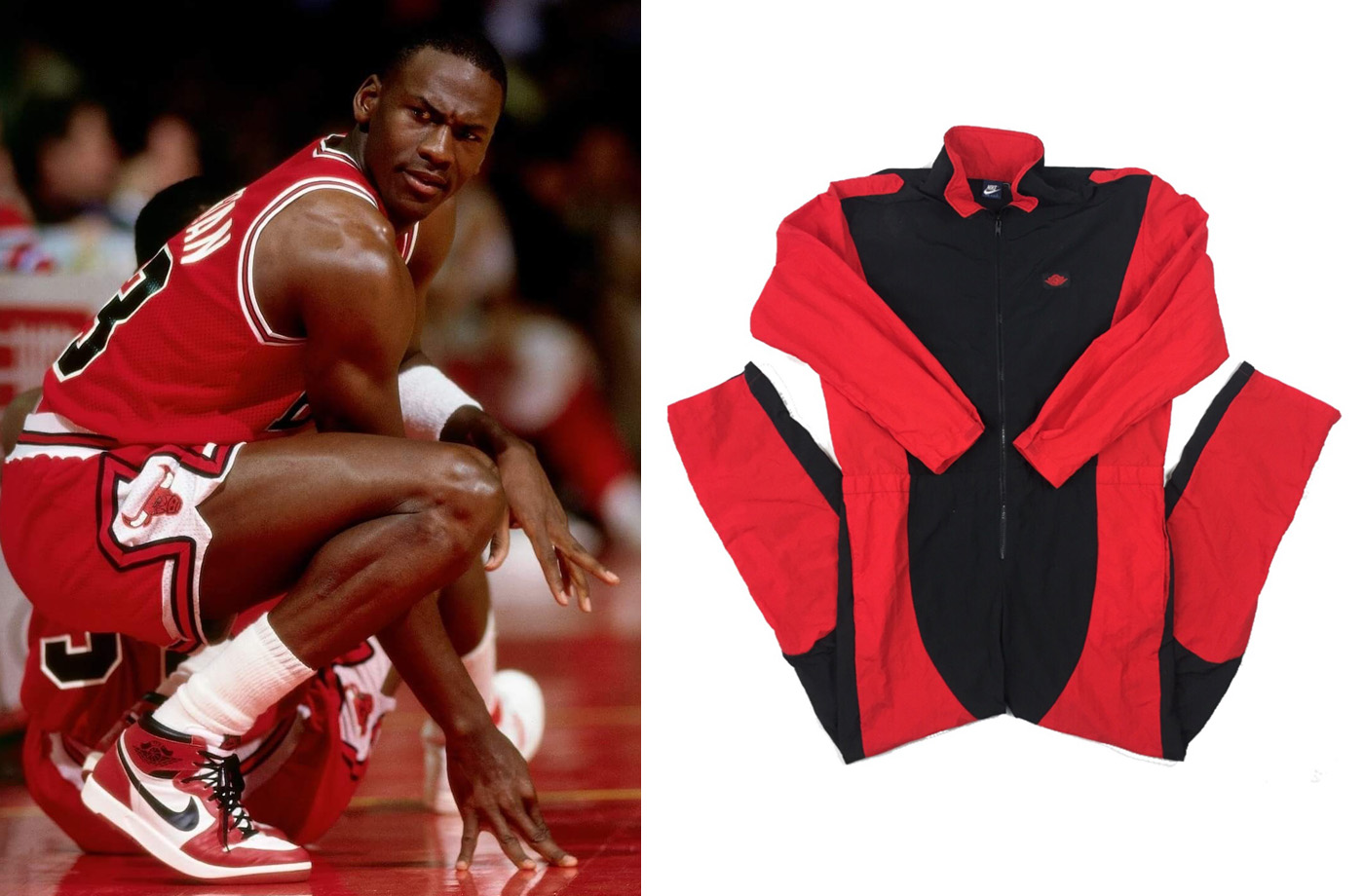 Photos via Getty Images & Depop
Photos via Getty Images & Depop
Throughout his oft-injured sophomore season, the Air Jordan 1 remained in stores as a staple and on the feet of Michael in adapted PE form. Aside from the coveted Dunk Sole exclusive, MJ famously wore what is now called an Air Jordan 1.5 as it featured the upper of the Air Jordan 1 atop the sole of the upcoming Air Jordan 2. Oddly enough, it also featured the Wings logo, with Nike appearing above the ball rather than Air Jordan tagging.
Heading into the 1986-87 season, Michael Jordan was healthy, and the market was hungry for a sequel to the shoe that changed everything. Because of this, Peter Moore, Rob Strasser, and Air Force 1 designer Bruce Kilgore changed everything.
Signaling Mike’s maturity and desire to be his own entity, the Air Jordan 2 was luxuriously made in Italy and bumped the price-point up to $100. Additionally, there would be no Swoosh on the sidewall but rather a bold black and red Wings logo embossed on the tongue. The iconic branding was also emphasized on the shoe’s premium packaging.
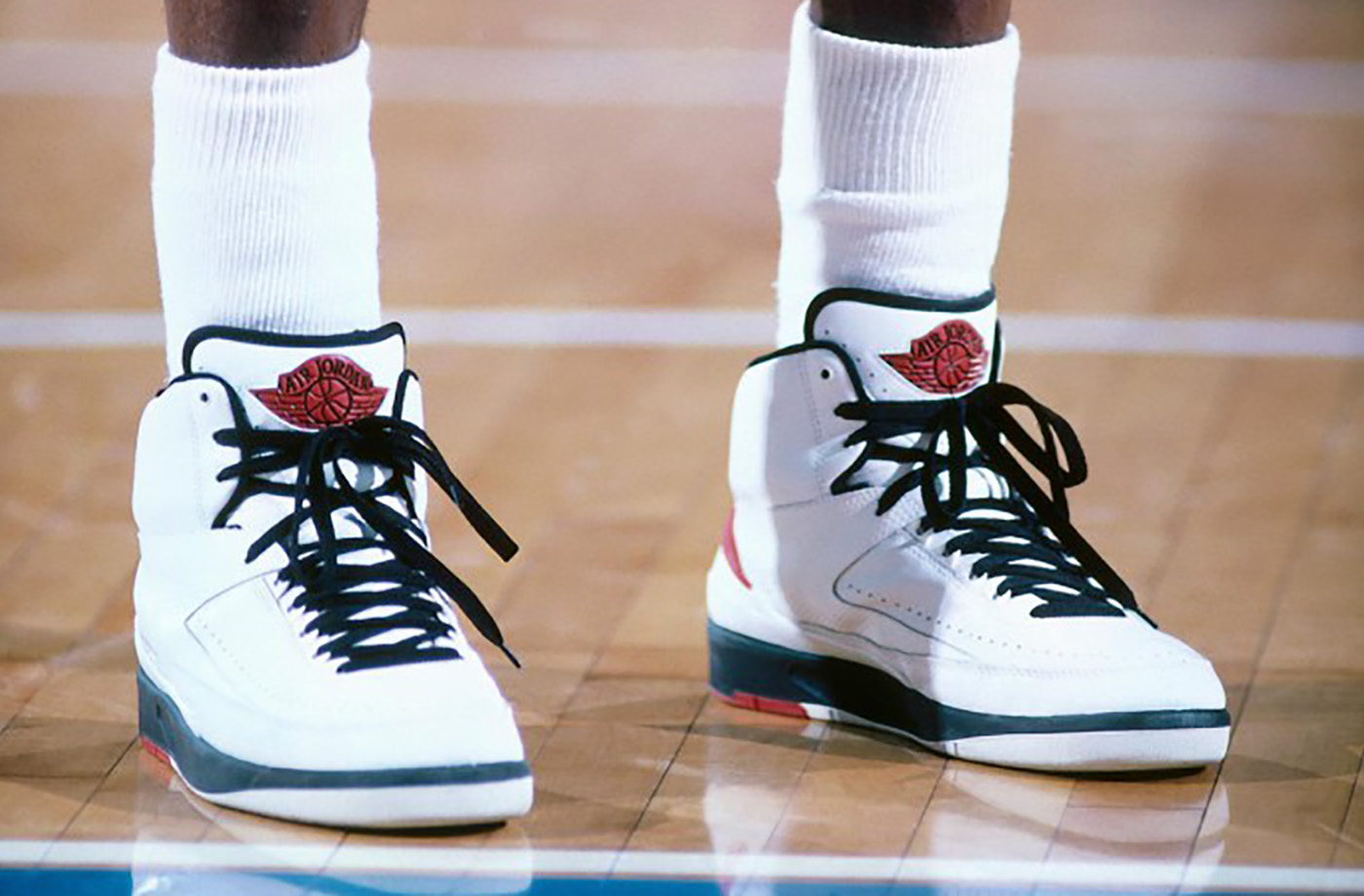 Images via Getty Images
Images via Getty Images
Considering sales, the Air Jordan 2 did not live up to its predecessor. However, Moore and Strasser soon left Nike, urging Michael to do the same and start his own company. For a moment, it seemed certain MJ would bounce from Beaverton, becoming his own brand by leveraging his likeness with the core creative team that drew the Wings logo and built the Air Jordan empire.
Sensing an exodus, Phil Knight called up-and-coming designer Tinker Hatfield to pitch the third Air Jordan model in a last-ditch effort to keep Mike with Nike.
It worked.
The elephant print packing, ¾ cut, visible Air assisted Air Jordan 3 was an instant industry shifter as it not only kept MJ with the brand but bolstered the energy around his line to desired heights. However, aside from Moore and Strasser being replaced by Tinker, one other important ingredient was missing.
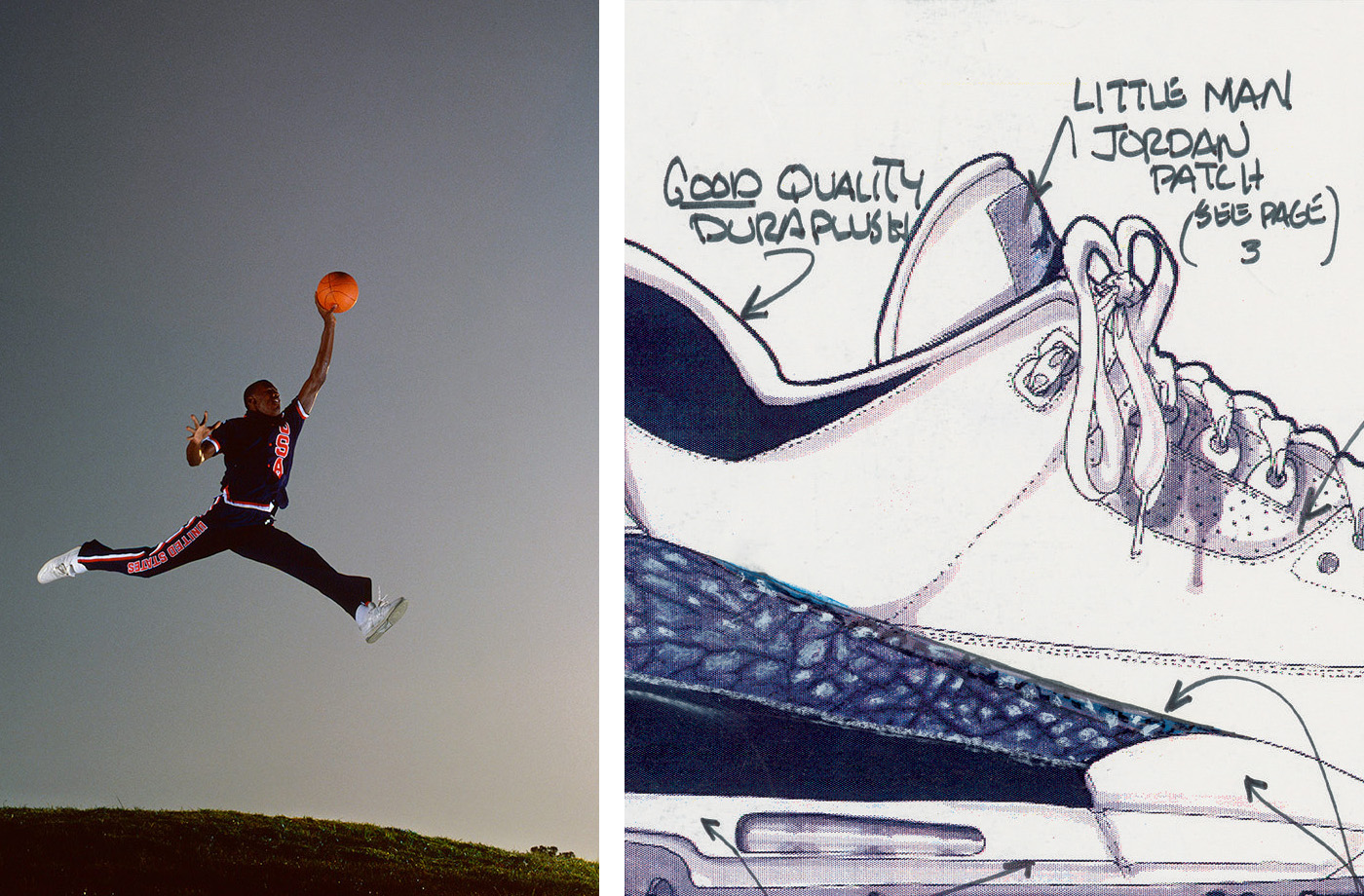 Images via TIME and Nike
Images via TIME and Nike
Almost overnight, the Wings logo was gone.
Branding the tongue with a ‘little man Jordan’ – later known as the Jumpman – Chicago’s superhero now had a new badge and branding to call his own. For eras to follow, Mike’s flying silhouette soared as the most powerful player logo in sports marketing history.
Closing the decade, the cocktail napkin sketch would fade to the background, only brought back out on special occasions as a nostalgic nod to the past.
1990s
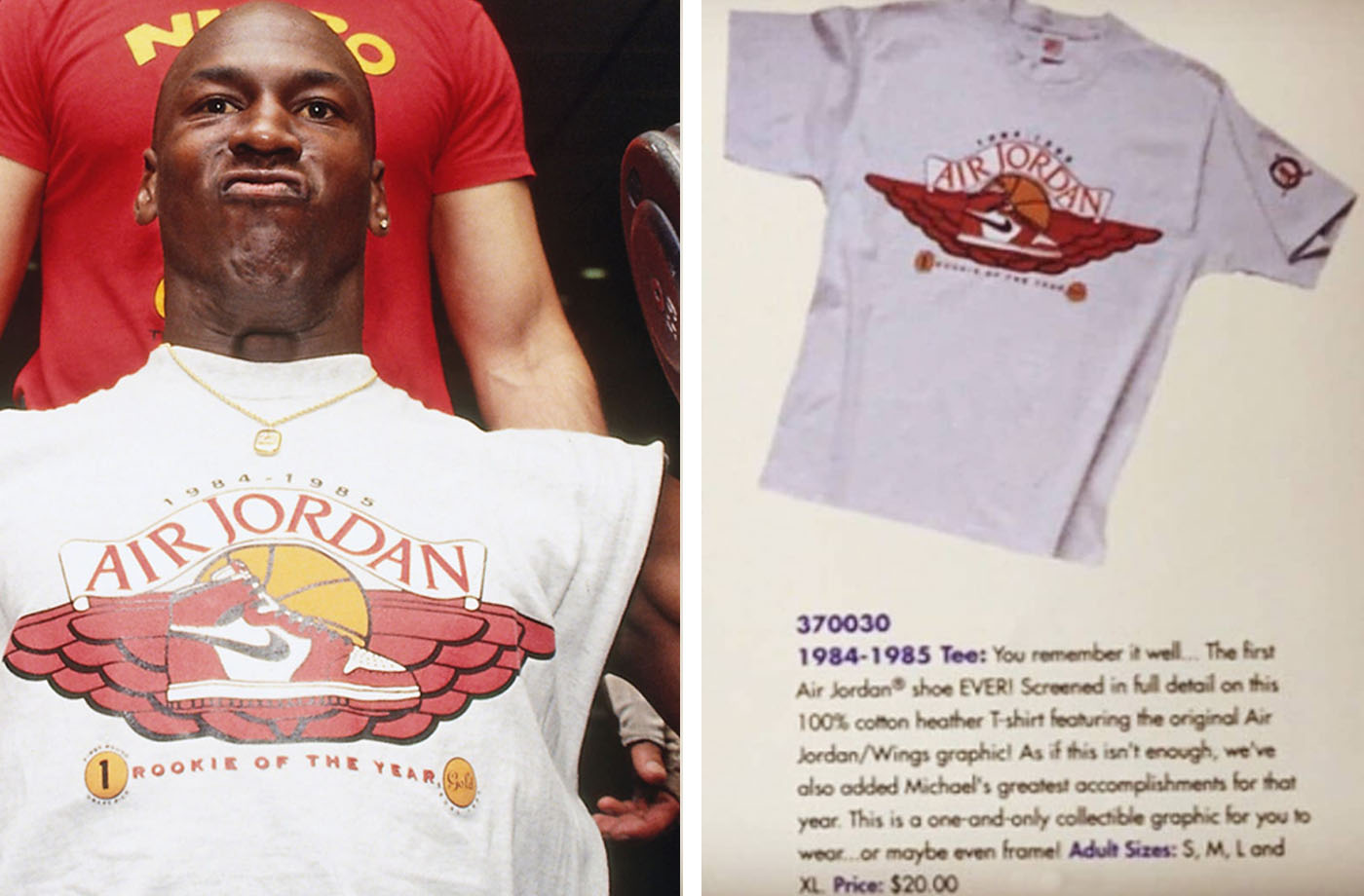 Photos via GQ and Blue Tag Club
Photos via GQ and Blue Tag Club
Over the course of the 1990s, the Jumpman would fly higher than anyone could ever imagine. On the court, Michael captured three straight NBA Championships to solidify his place as basketball’s best. Each shoe and corresponding clothing collection featured the Jumpman logo, rooted in performance but quickly crossing over into everyday fashion.
Despite the new direction and design success under Tinker, Nike paid tribute to the toast of the league’s hot start with a Rookie of the Year shirt released right around 1991. Mike can be seen training in this tee with Tim Grover, cutting the sleeves off as he quickly popularized. The $20 shirt offered homage and nostalgia years before both became the norm.
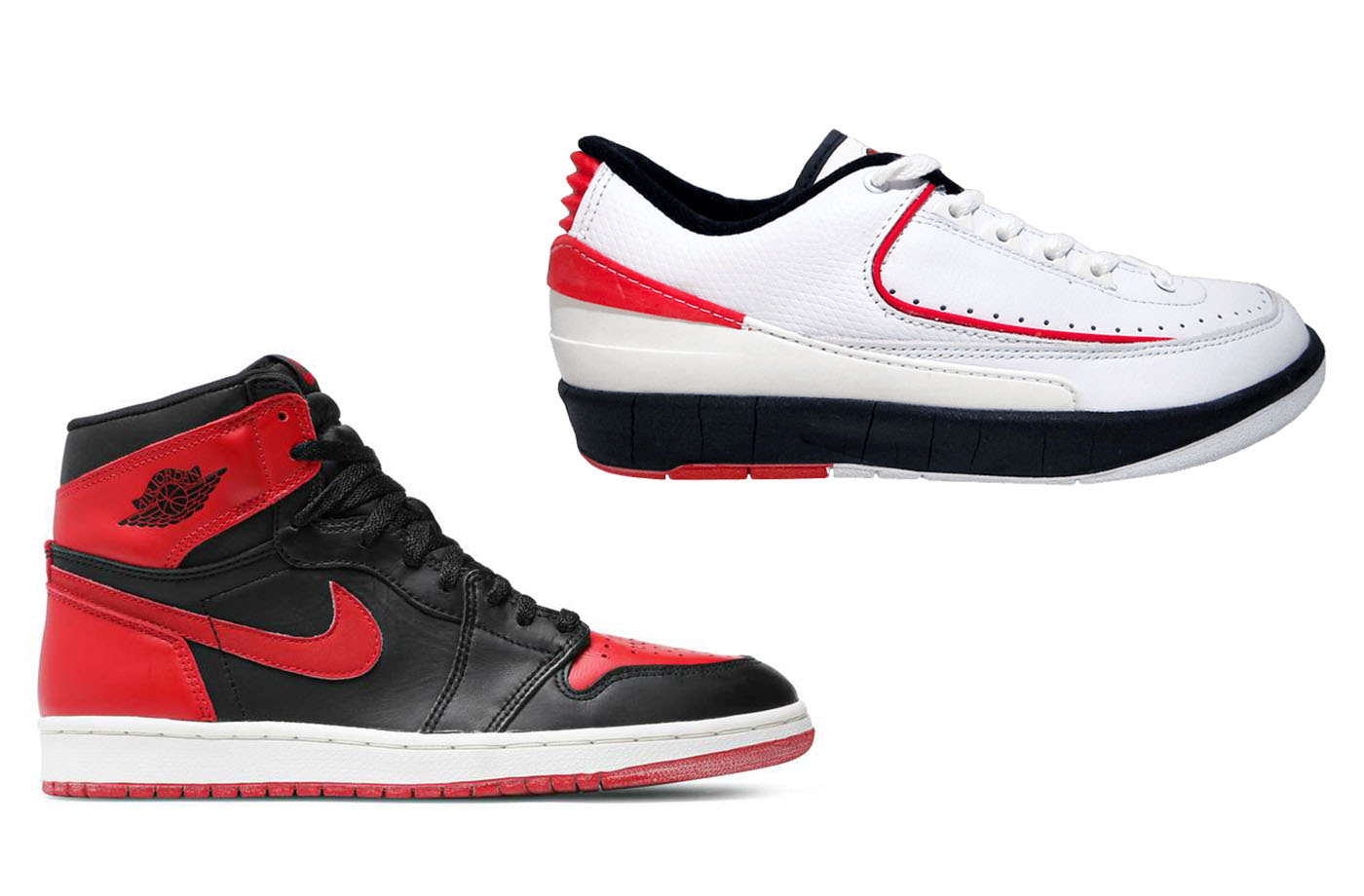 Images via GOAT
Images via GOAT
Just as Nike started playing with nostalgia the plot seemingly asked for it.
As fate would have it, the unprecedented Air Jordan line celebrated its 10-year anniversary at the same time as another unprecedented event: Michael Jordan’s surprise retirement. Over the course of 1994 and 1995, Nike re-issued the Wings laden Air Jordan 1 and Air Jordan 2 to lukewarm reception at retail. Original packaging for both models was replaced by commemorative boxes quietly bearing the Wings logo as a stamp atop a collage of Mike’s memorable commercials.
Fans weren’t feeling the first round of retros, but better days were ahead.
By the spring of 1995, Michael Jordan returned to basketball, but the Wings logo didn’t return with him. Much more modern, the eventual unveiling of the Air Jordan 11 was a far cry from nostalgia and an all-new energy. Instead, the comeback kicks made the Jumpman logo bigger, revitalizing the line through innovation while unknowingly laying the foundation for the real retro boom down the road.
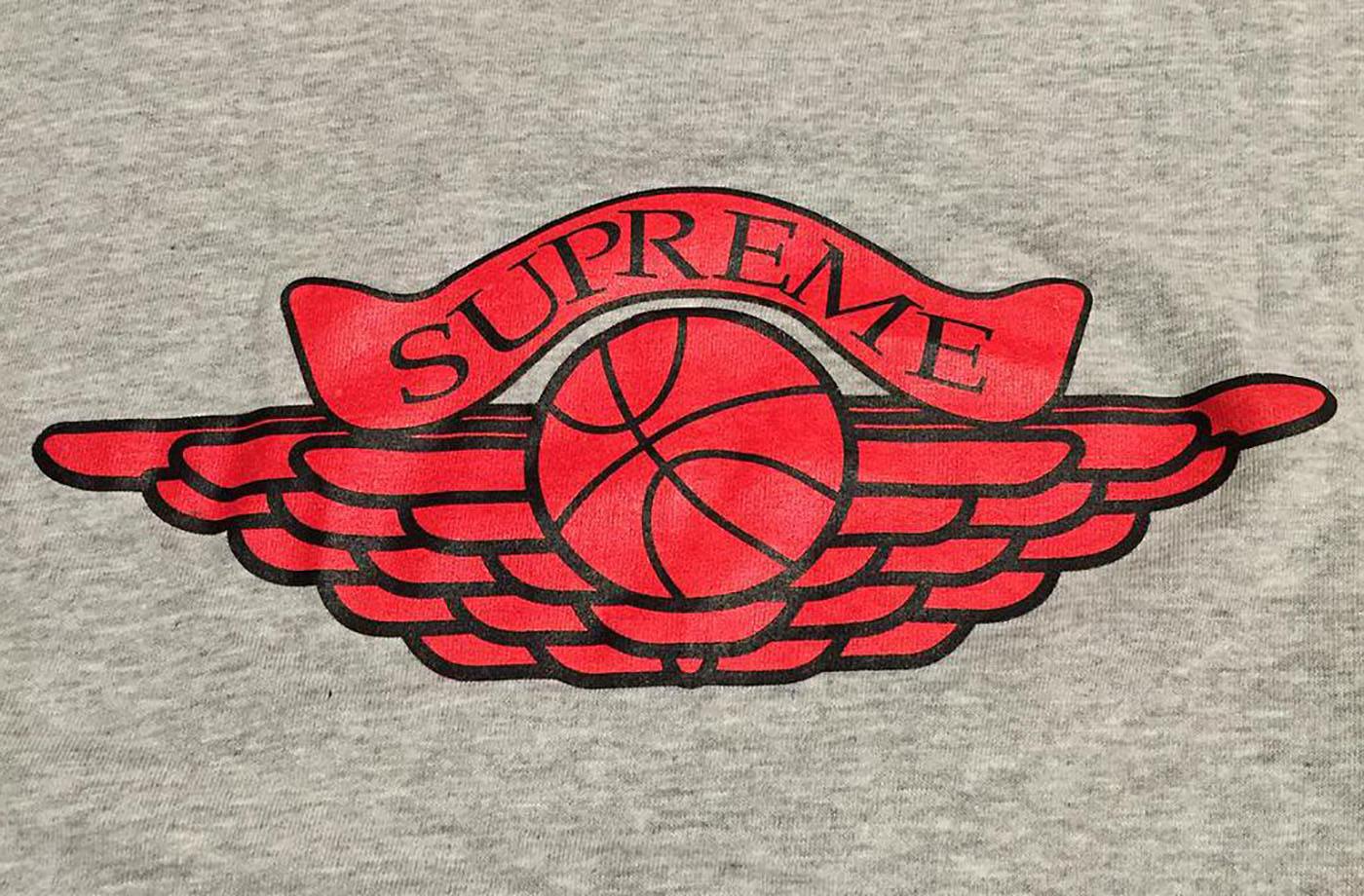 Image via Grailed
Image via Grailed
As the ‘90s came to a close, Michael Jordan’s return to glory capped off with six total championships and the arrival of his own subsidiary entity under Nike: Brand Jordan. However, rather than celebrate past achievements and styles, the introductory collection from CEO Jordan celebrated street, style, and the next generation through futuristic fonts and edgy apparel.
Consider this: what’s further removed from the AJ1 Wings logo than the AJ13 hologram?
Though Mike may have been thinking forward in the late ‘90s when it came to clothes, the counterculture was beginning to crave the past. This sentiment was best expressed by a Wings logo homage/parody tee sold by Supreme in 1998. Not only did it shed light on skate’s early endorsement of the Air Jordan 1, but it also paved the way for other streetwear companies to pick and pull from Air Jordan DNA.
For the decade to follow, this underground current would instantaneously inspire Brand Jordan to do the same.
2000s
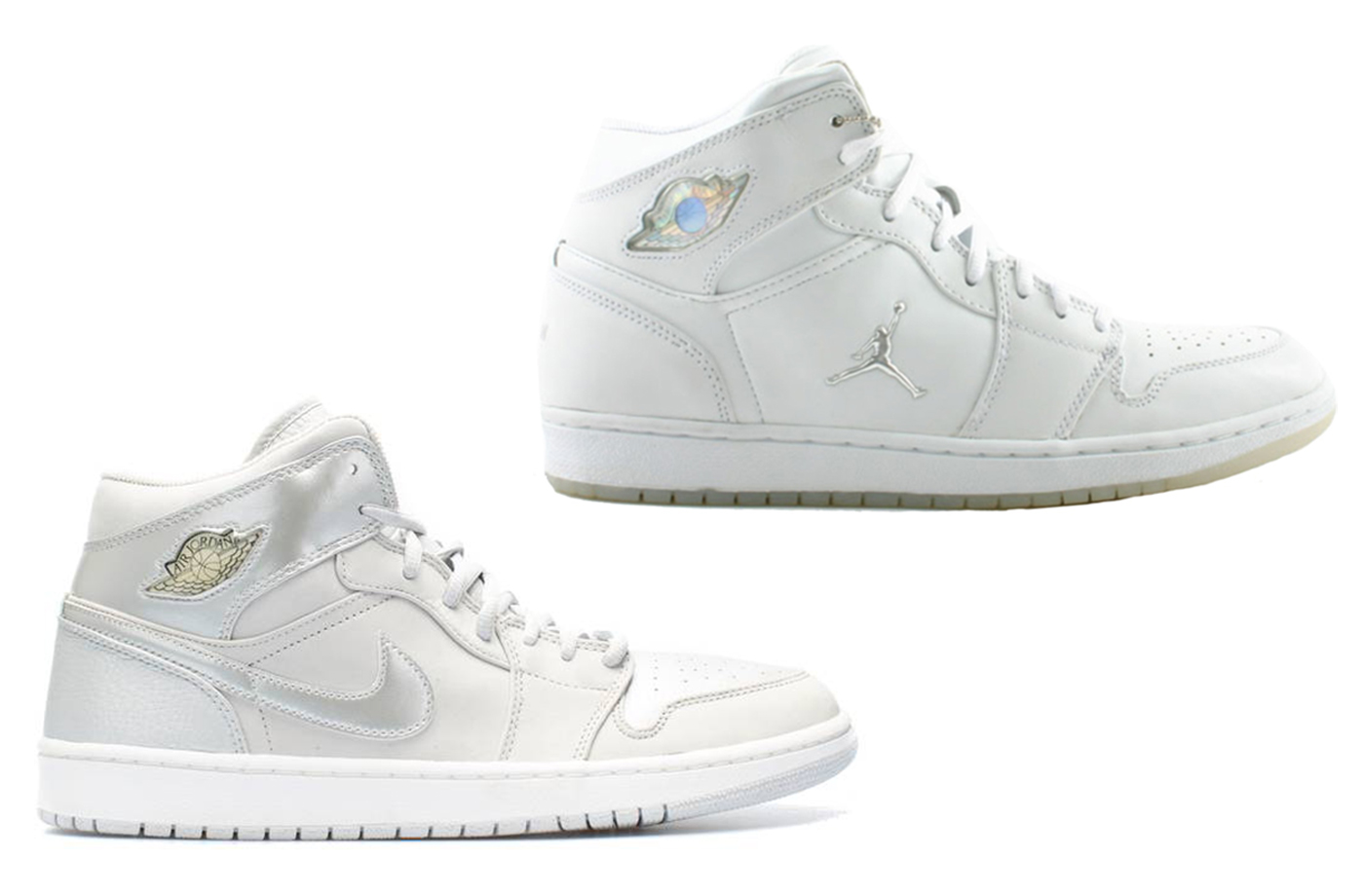 Photos via Flight Club and StockX
Photos via Flight Club and StockX
Just as an athlete aims to discover who they are off the court once they retire, so did Jordan Brand. The 2000s were a time of experimentation, smash hits, and major misses for the transitioning company that now earns over $3 billion a year.
After an uneasy run of retros in the 1990s, the Mike-less market was now all the way ready for the old. While teased in 1999 with the return of the Air Jordan 4 Retro, it ignited to new levels with the 2000 Air Jordan 11 Retro.
Soon, the market for old mattered more than ever for Mike.
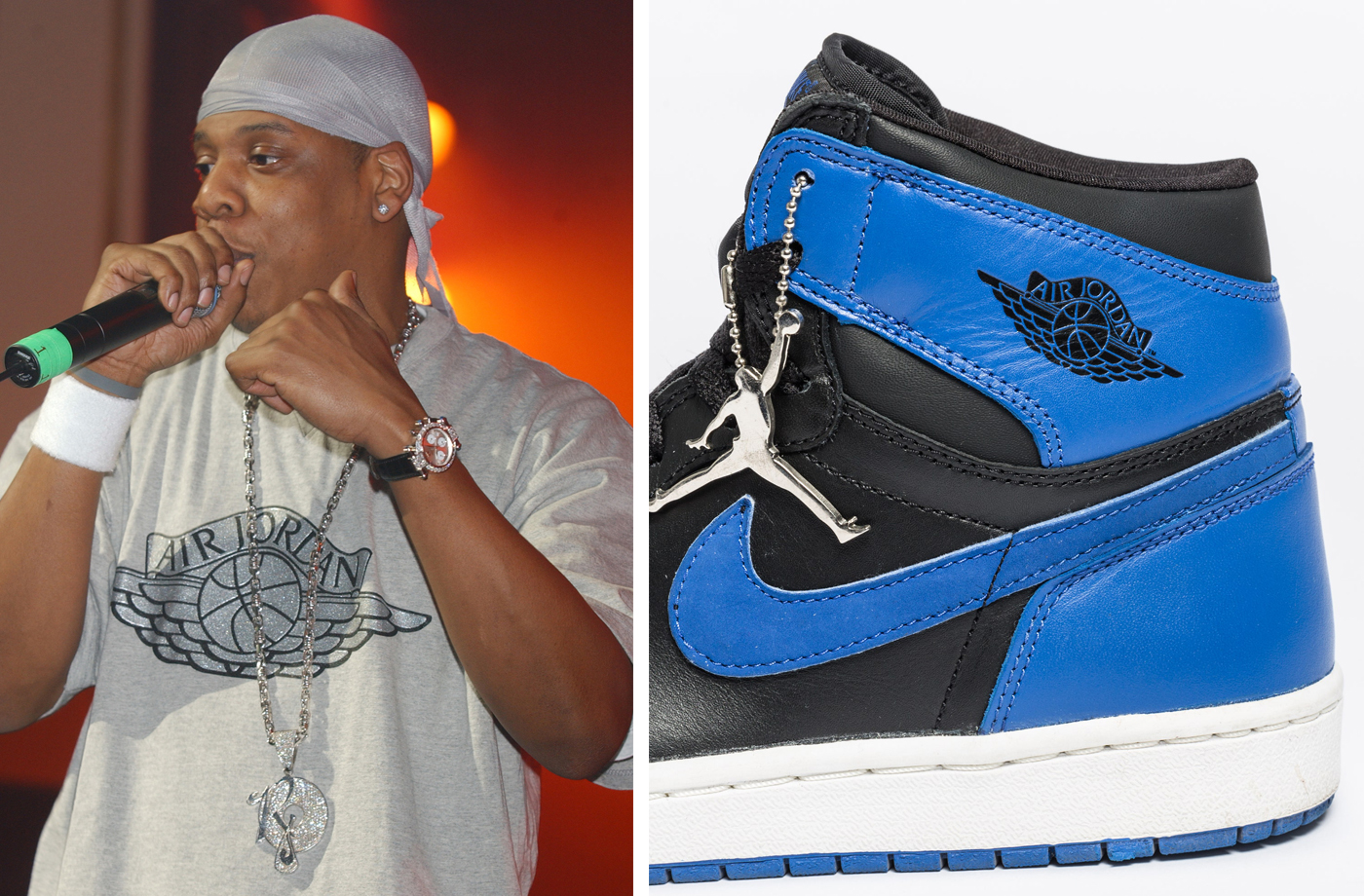 Images via Getty and GQ
Images via Getty and GQ
2001 saw the return of the original: the Air Jordan 1 Retro. Takes from that era on the Air Jordan 1 featured a somewhat modernized mid-cut, rolling out OG “Royal” and “Banned” motifs to far greater fanfare than 1994 releases. Increasing the reach and the chase, Jordan Brand also pushed the envelope overseas by bringing shiny and quiet colorways to Asia as CO.JP exclusives. The Eastern hemisphere rarities played perfectly to a market that always loved foundational products, whether ‘80s footwear or hip-hop vinyl.
Aside from the shape, Jordan Brand doubled down on newness by adoring each Air Jordan 1 with a metallic silver Jumpman hangtag. Certain styles even saw patent leather placement, while the Wings logo took on a jewel aesthetic. Even more unexpected and overt, a White/Metallic Air Jordan 1 replaced its sidewall Swoosh with a silver Jumpman.
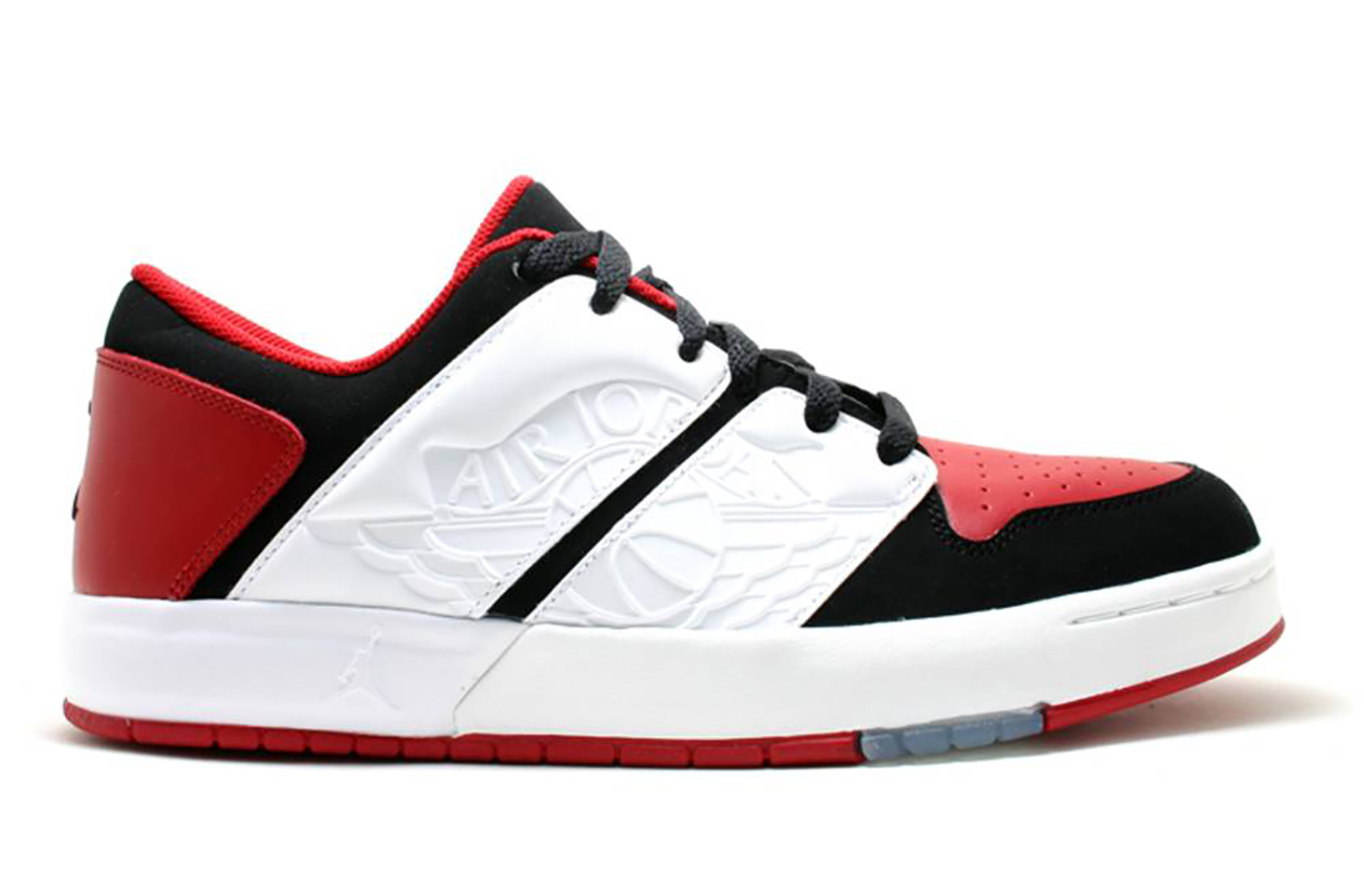 Image via Flight Club
Image via Flight Club
The early-2000s also saw the Wings logo take flight in a totally revitalized fashion. The Nu Retro 1 and Nu Retro 2 reimagined both originals in unorthodox styling. Appearing almost as a skateboarding shoe, the Nu Retro 1 embossed the Wings logo all over the sidewall. Conversely, the Nu Retro 2 donned a jewel Wings logo on the tongue and received hardwood endorsement from the likes of Raymond Felton and Fred Jones.
Continuing the past meets progressive marriage, the Jordan Melo 1.5 served as a modernized mashup of the original two Air Jordans as the first signature shoe for newly signed Carmelo Anthony. Metallic Wings logos appeared on the medial side of each shoe while matching merchandise highlighted the archival branding in bold fashion on fitted hats and headbands.
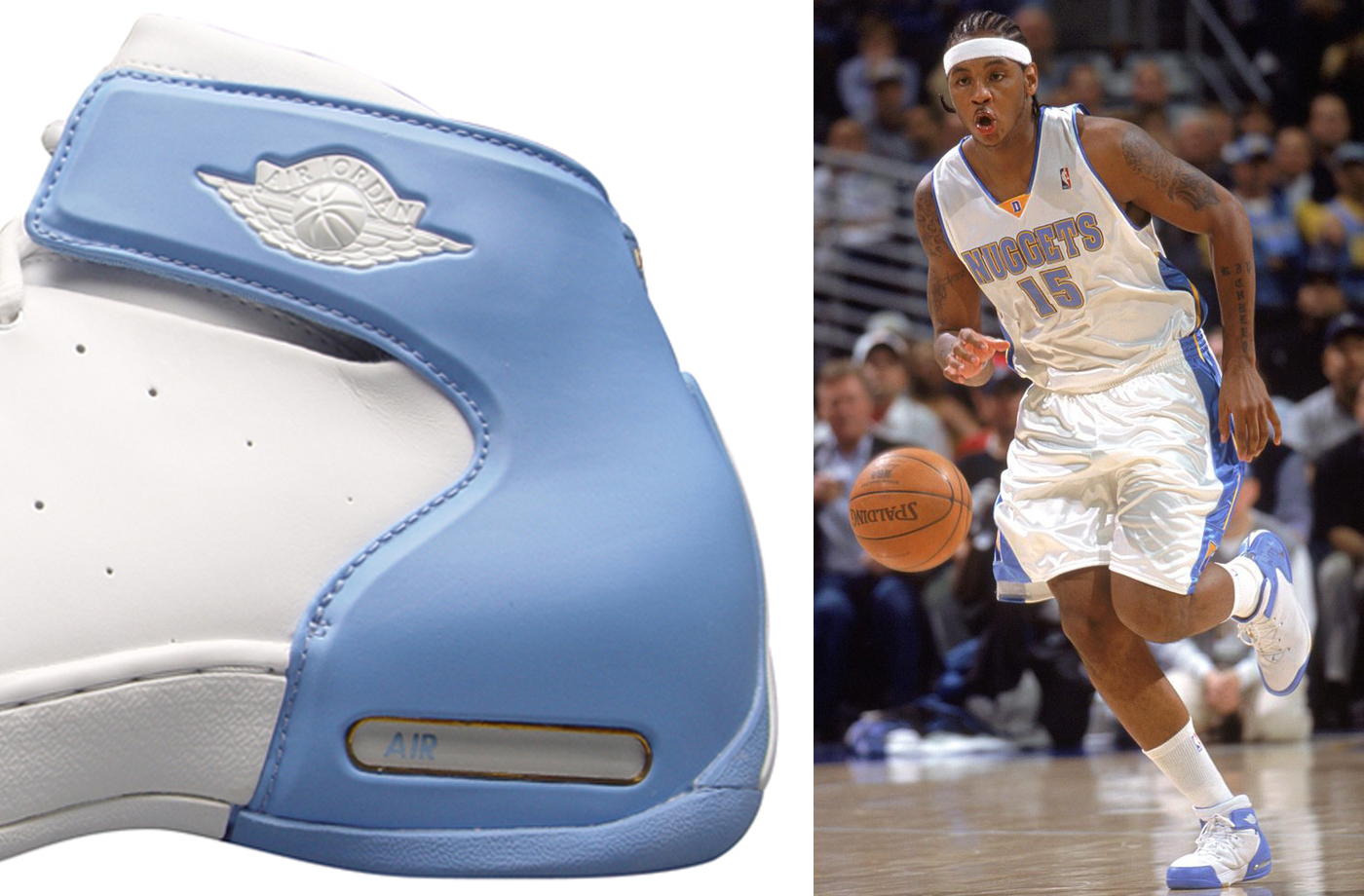 Photos via Kix Stats and Getty Images
Photos via Kix Stats and Getty Images
When it came to refreshing the Wings logo, hybrid homages like the Nu Retro series and .5 Melo line went away as fast as they came in. Throughout the 2000s, Air Jordan 1 and Air Jordan 2 retros would shift shapes, styling, and cuts, carrying the Wings logo as an unwavering attribute of authenticity.
From a fashion standpoint, the 2000s were mostly defined by oversized streetwear misses when it came to Jordan Brand apparel. However, the company did return to its roots through certain Wings branded items like remakes of archival track jackets. In many ways, these items and the interested market previewed the vintage lane for Jordan Brand that wouldn’t truly open up on a mass level until the Air Jordan 1’s rise in the mid-2010s.
2010s
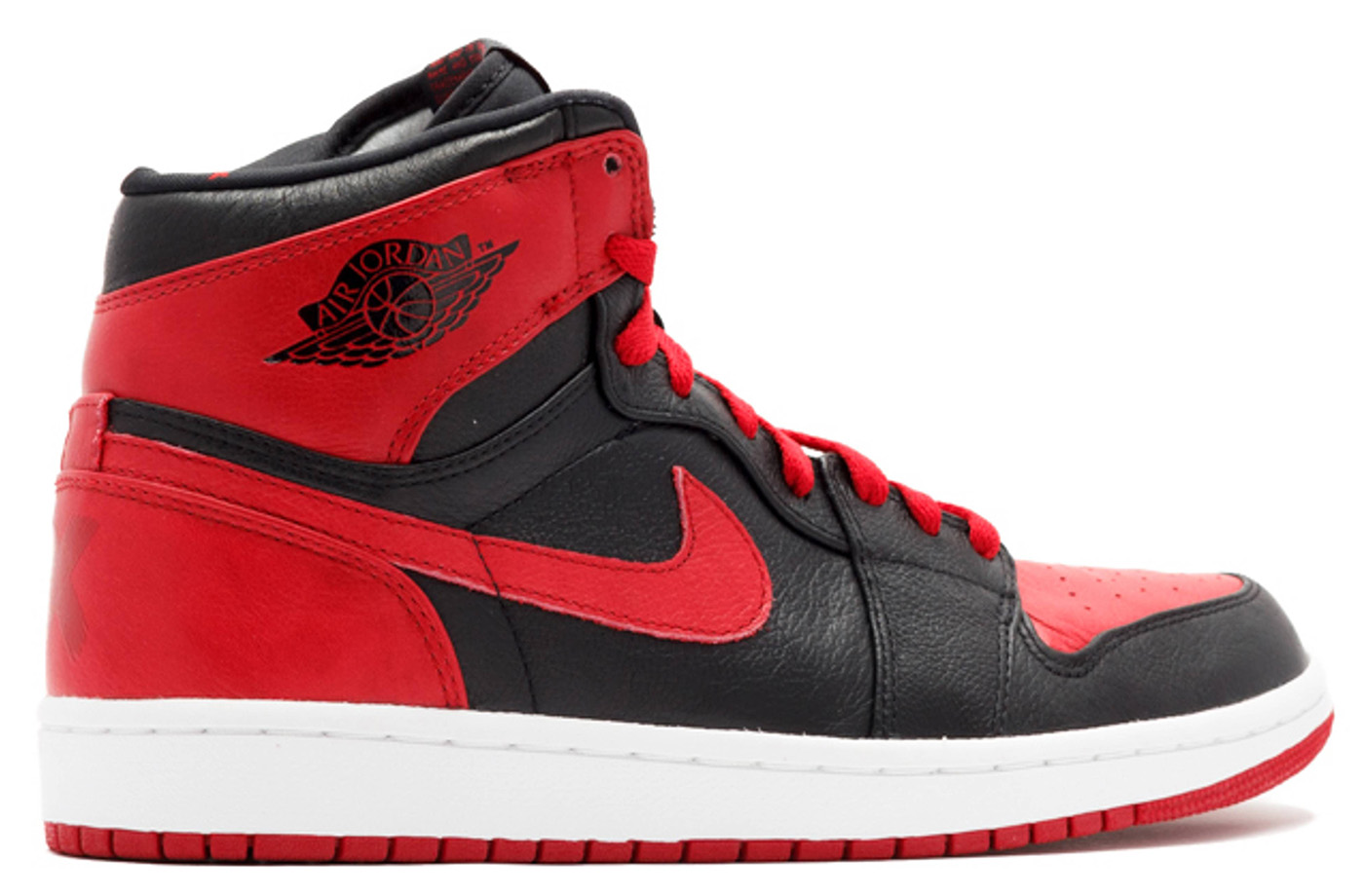 Photo via Flight Club
Photo via Flight Club
The 2010s saw the revival of the vessel the Wings logo arrived on: the Air Jordan 1. After oddball buzz from the outlet launch of the “Banned” Air Jordan 1 in 2011 and unofficial endorsement by Kanye West, the AJ1 High hit a peak as the most popular model in modern footwear for the first time since 1985.
Even at the time of publishing, this proves true.
During the 2010s, the rise of retro AJ1s also accelerated interest in Air Jordan 1s from 1985, 1994, and 2001. This trend in wearable vintage vaunted blue tag t-shirts and jackets from the same era, soon pushing Jordan Brand to lean into heritage through collaborations.
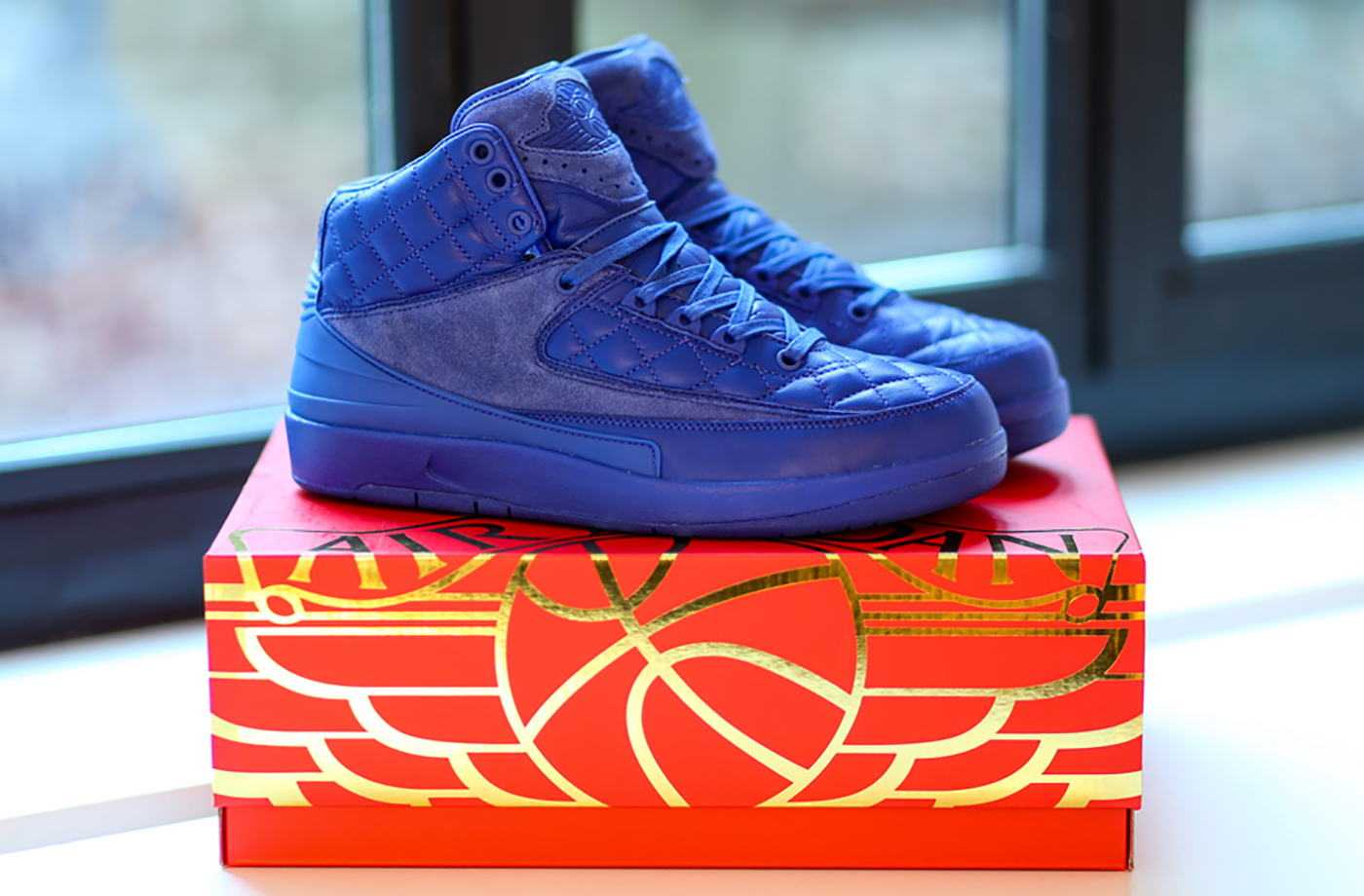 Image via Titolo
Image via Titolo
Such was seen on Don C’s string of Air Jordan 2 and Union’s expansive collection of footwear and apparel around the Air Jordan 1. Chicago’s own Don Crawley famously featured the Wings logo in grand fashion on the packaging, hats, and golden pins privy to those who copped his kicks.
Out West, Chris Gibbs gave the AJ1 an aged “What the OG” aesthetic inspired by swap meets. All the while, terry cloth sweatshirts, and tees by Union featured the Wings logo with sample status Nike tagging.
To this day, the Union x Air Jordan 1 High stands as one of the pivotal collaborations of the 2010s from a footwear standpoint while its apparel competes with high-priced peers on La Brea.
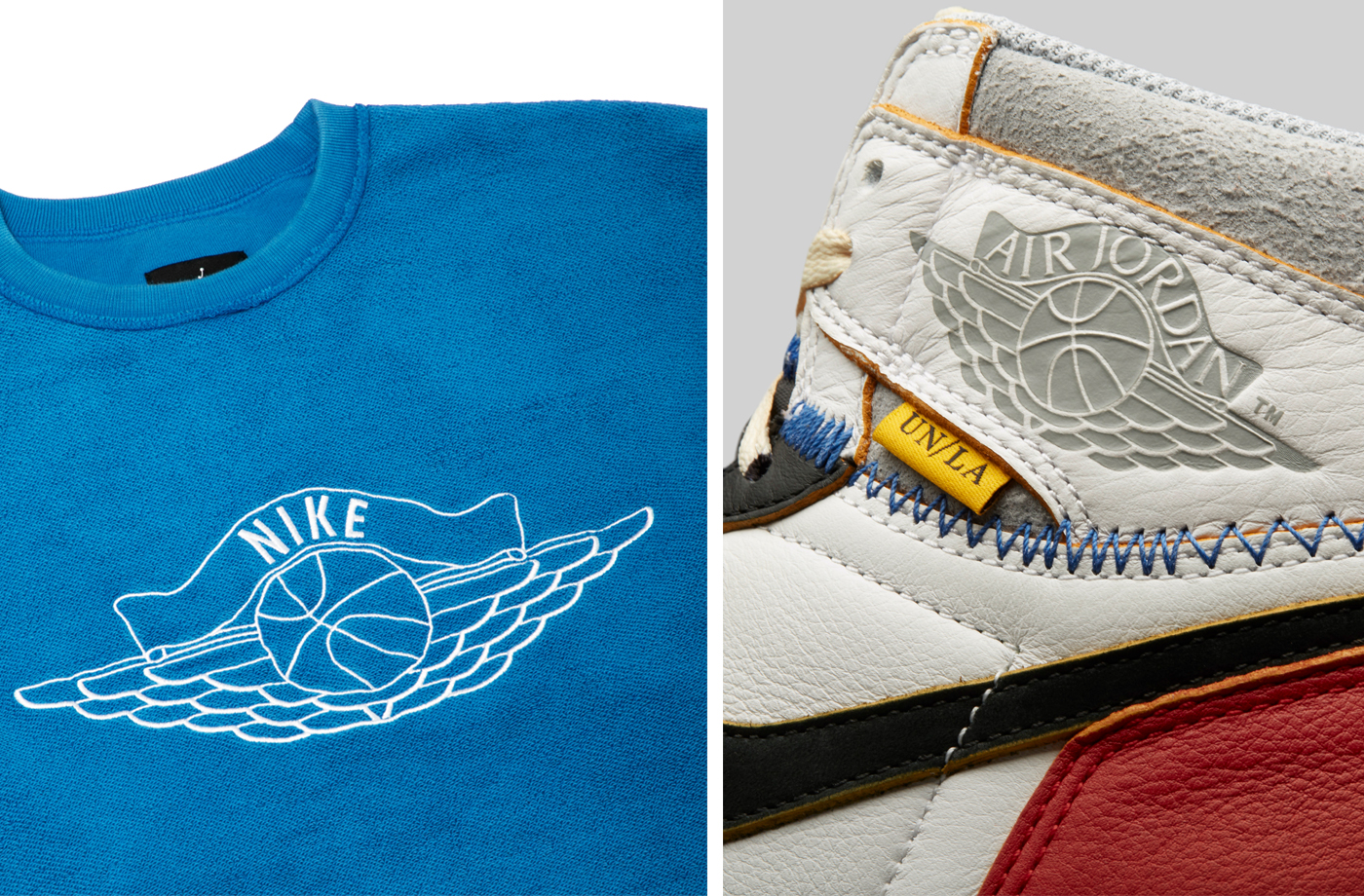 Images via Nike
Images via Nike
The Wings logo returned to the hardwood in 2017 and in similar fashion to its cameo on the Melo 1.5 a decade prior. The Air Jordan 32 was directly influenced by the last franchise favorite to feature it – the Air Jordan 2 – wearing Wings on the tongue just as the original.
Despite a launch event in Italy and wear from the likes of Russell Westbrook, Kawhi Leonard, and Jimmy Butler, the Air Jordan 32 was mostly a miss at retail and reason to depart from the on-the-nose OG inspiration introduced on the Air Jordan 31 and 32.
In many ways, this paralleled the short run of the Nu Retro campaign canceled the decade prior.
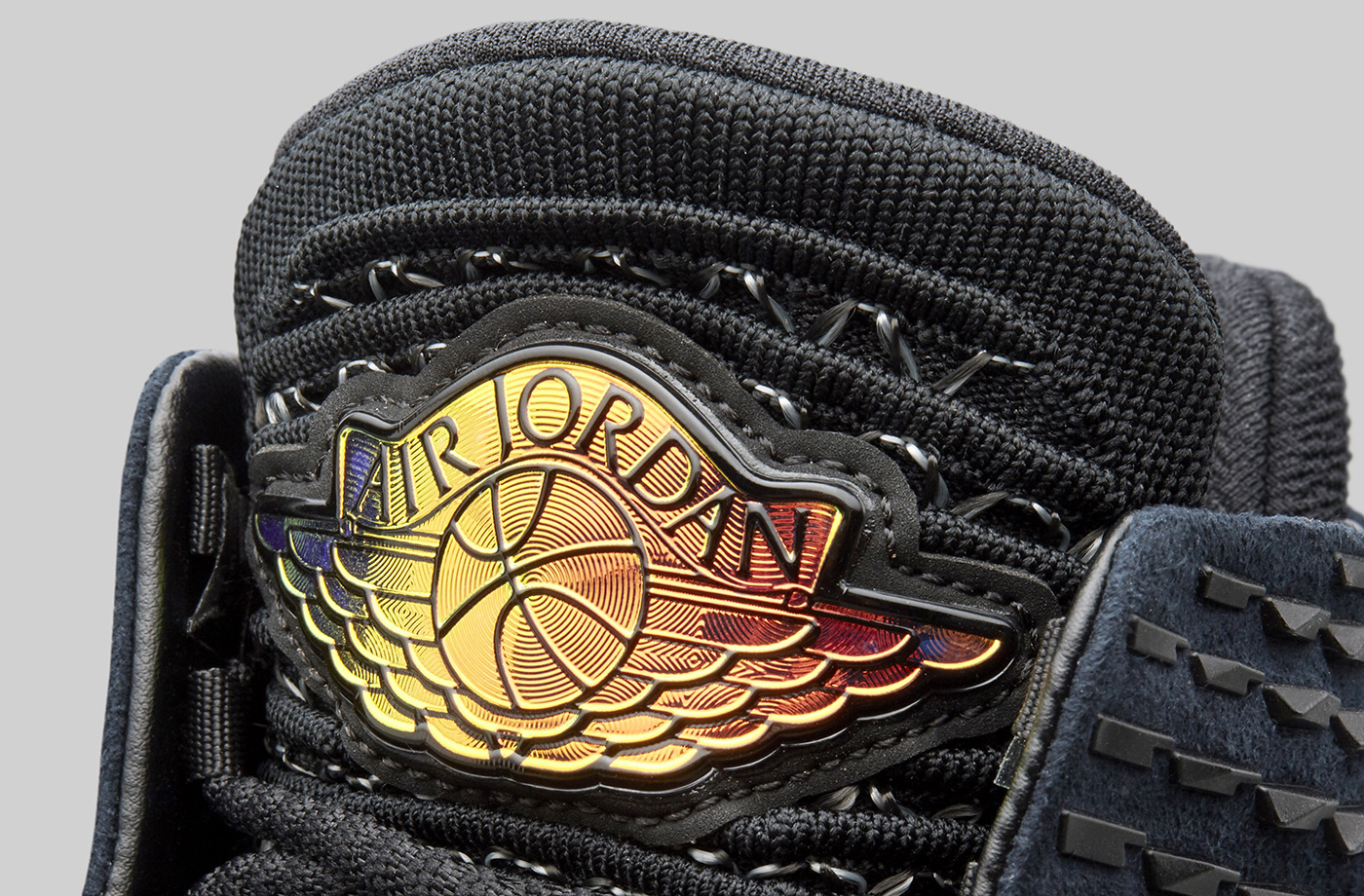 Image via Nike
Image via Nike
After the 32 flop, it appeared the Wings logo would no longer be used for the masses even if branding wasn’t the reason for relative failure. By that time, the Jumpman had become the badge of honor for everyday people of all ages, eras, and walks of life.
Conversely, the Wings logo has ascended to vaulted, niche status, sold to those looking for the refined rare.
2020s & Beyond
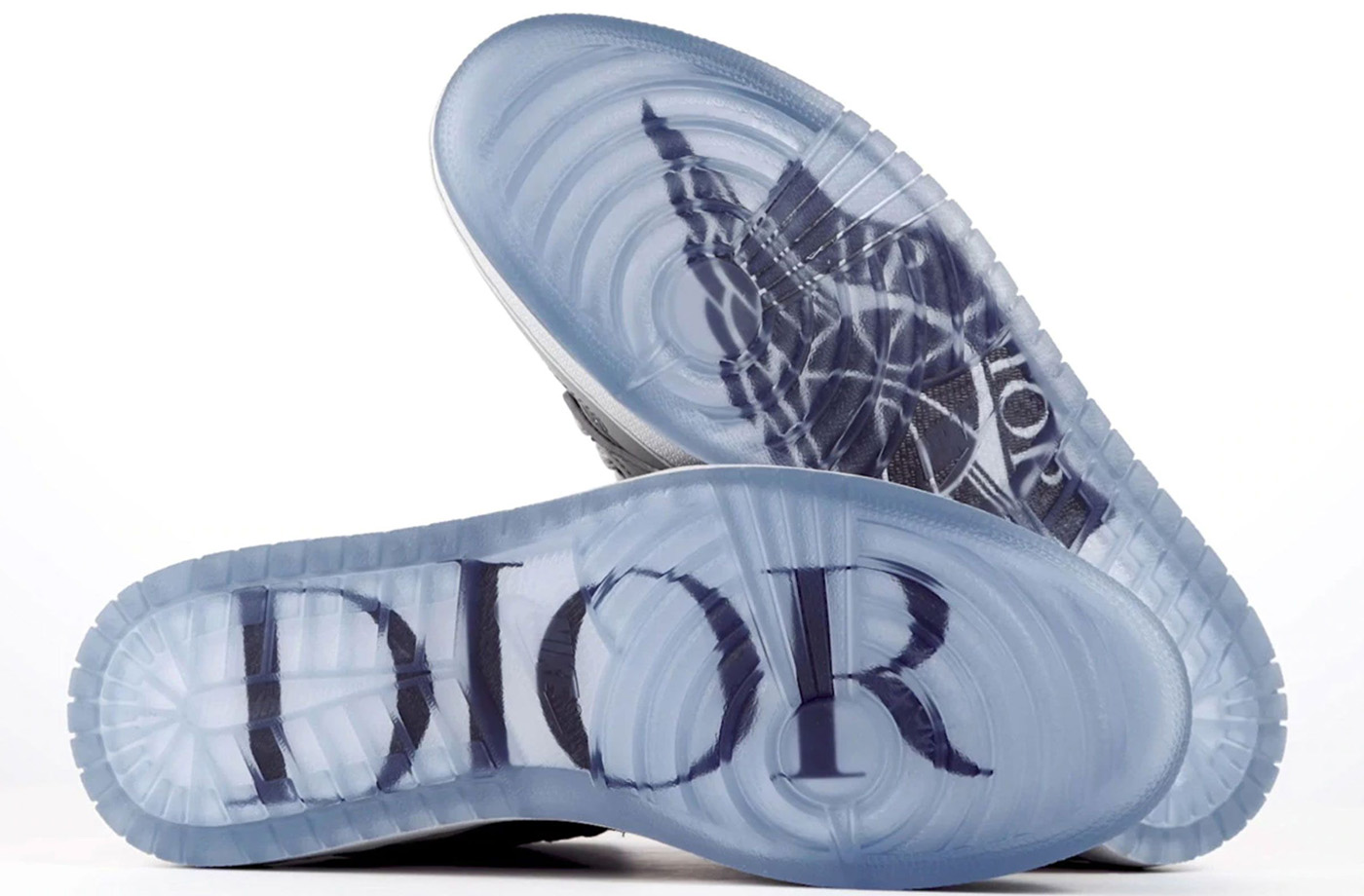 Image via Dior
Image via Dior
In the infancy of the 2020s, the boutique stature of the Wings logo likened to Union and Don C leans even stronger.
Famously, the archival branding has been reimagined with ‘Air Dior’ tagging on high-priced footwear, sweaters, and accessories from the 2020 Dior x Air Jordan 1 collection. With high-top takes retailing at $2000 a pair, this cross-culture collaboration is positioned on a runway much different than the one Moore made his sketch on.
When considering the converging streams of sportswear and streetwear, the archival tagging still packs a punch on any canvas. Case in point, Virgil Abloh proved the power of the Wings logo on the 2020 Off-White x Air Jordan collection. Although the heritage branding has nearly no association with the original Air Jordan 5 range it was inspired by, Abloh chose Wings when rolling out his latest launch.
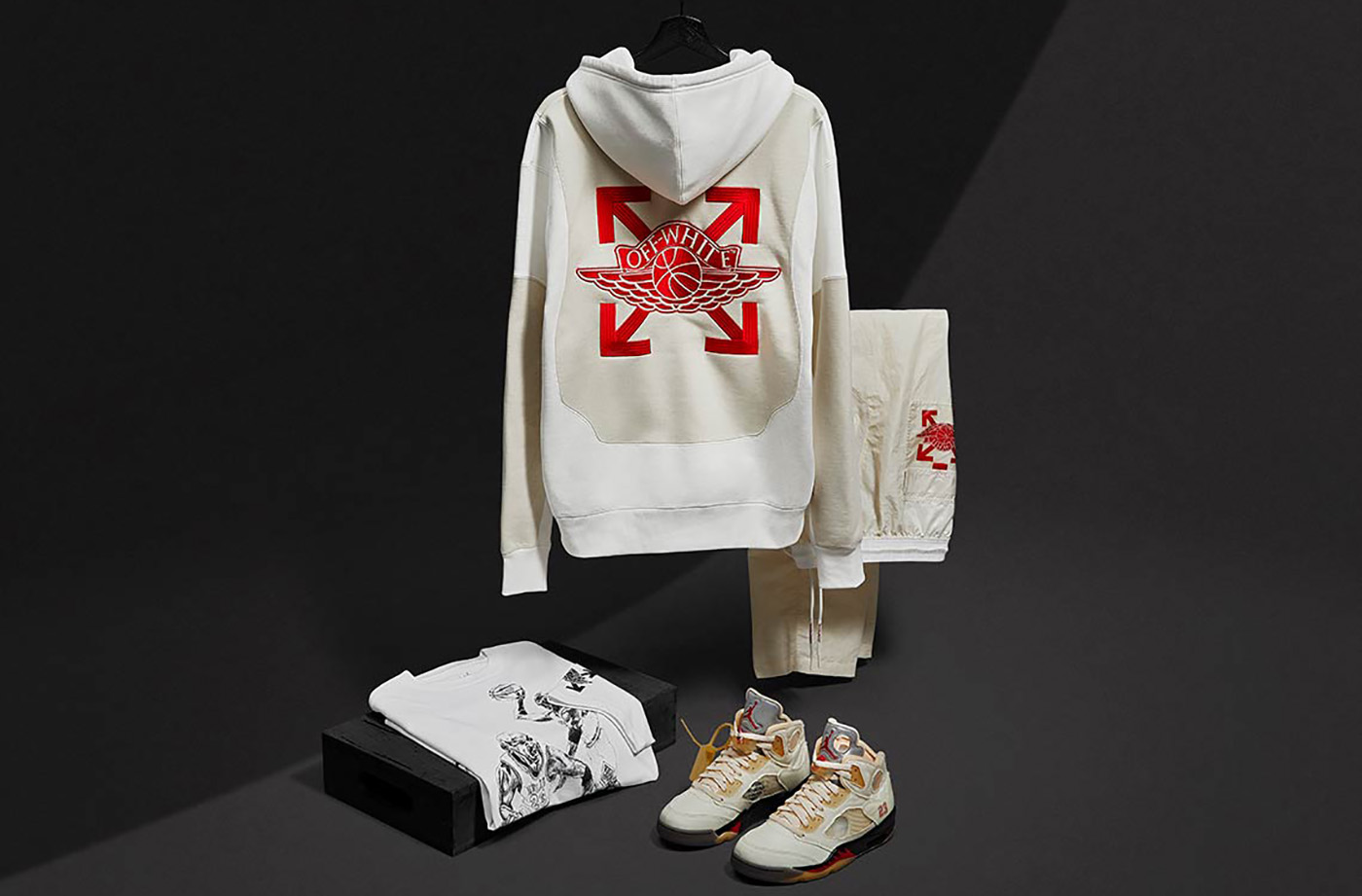 Image via Nike
Image via Nike
Now in its fifth decade of use, the Wings logo lives almost exclusively on lifestyle products as a signifier of heritage and wisdom. To this day, vintage collectors continue to chase blue tag t-shirts and ‘85 originals while the savviest streetwear fans seek fine fabrics adorned by Peter Moore’s napkin sketch.
Today, the pilot pin branding positioned to children in the ‘80s no longer steers the multi-era empire that is Air Jordan. Instead, it’s the Jumpman logo that’s lacing everyone from toddlers in velcro retros to proud parents watching from the stands.
Missing the masses, it’s the Wings logo that shines a light on the OG obsessed. The Wings logo, not the Jumpman, represents the hearts of those no longer taking flight on the court but still allowing their inner-child to take flight.


